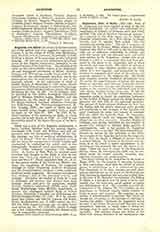

Augustin von Alfeld (ALVELDT, or ALVELDIANUS), one of the earliest and most aggressive opponents of Luther, b. in the village of Alfeld, near Hildesheim, from which he took his surname; d. probably in 1532. Nothing is known of his parentage, youth, and early training. He first comes into prominence as a Franciscan of the Regular Observance, belonging to the Saxon Province of the Holy Cross. The absence of his name on the matriculation rosters of the philosophical and theological universities of Erfurt, Rostock, Leipzig, and Wittenberg, usually frequented by the members of the abovenamed province, leaves the presumption that he made his studies in one of the monastic schools. At the solicitation of Adolf of Anhalt, Bishop of Merseburg, in 1520, being already Lector of Holy Writ at Leipzig, he entered the theological arena to controvert the Lutheran heresy (Mencken, Scriptores rer. Ger., II, 56). On January 20, 1521, he presided at the public theological disputation held at Weimar, between Lange, Mechler, and the Franciscans, on the merit of monastic vows and life (Kapp, Kleinere Nachlese niitzlicher Urkunden zur Erlauterung der Reformationsgeschichte, II, 514, Leipzig, 1727), the result of which has not been handed down, though it called forth a satirical poem at the time (ib., 520). In 1523 he became Guardian of the monastery at Halle, in which position he is still found in 1528. In 1529 he was elected Provincial of the Saxon Province of the Holy Cross.
Alfeld was a man of fine linguistic attainments, a fluent Latinist, familiar with the ancient classics, conversant with Greek and Hebrew, and well acquainted with the humanistic writings of his day. His theology was that of medieval scholasticism, in which he proved “that the old theological training did not leave the antagonists of Luther helpless and unprepared in combating the novel, and to the theologically disciplined mind contradictory, assertions” (Otto, Johannes Cochimus, 132, Breslau, 1874). As Lector of Holy Writ, he devoted much attention and thought to the Bible, so that he can state that “from my childhood I have devoted my time and life to it” (Super Apostolica Sede, etc., iii a). In the textual studies of the Greek and Hebrew versions, the translation of Erasmus, the exegetical writings of Faber Stapulensis (Lefevre d’Etaples) and the Complutensians, he shows a keen, analytical mind and sound judgment. His memory and reputation, however, rest on his polemical activity and writings. The latter are marred at times by a tone of bitterness and sarcasm that detract from their intrinsic worth and gave his opponents, notably Lonicer, Luther’s amanuensis (Biblia nova Alveldensis Wittenberg Anno MDXX) opportunity to censure the catalogued epithets flung at Luther (Cyprian, Niitzliche Urkunden zur Erlauterung der Reformationsgeschichte, II, 158). If it be remembered that Luther calls him bos Lipsicus (De Wette, Brief e, Sendschreiben, etc., I, 446); asinus (op. cit., 451, 453, 533); Lipsiensis onager (op. cit., 446); Lipsiensis asinus (op. cit., 471, 475, 542), merely to single out a few controversial amenities, his literary style may be measurably condoned.
HENRY A. GANSS

